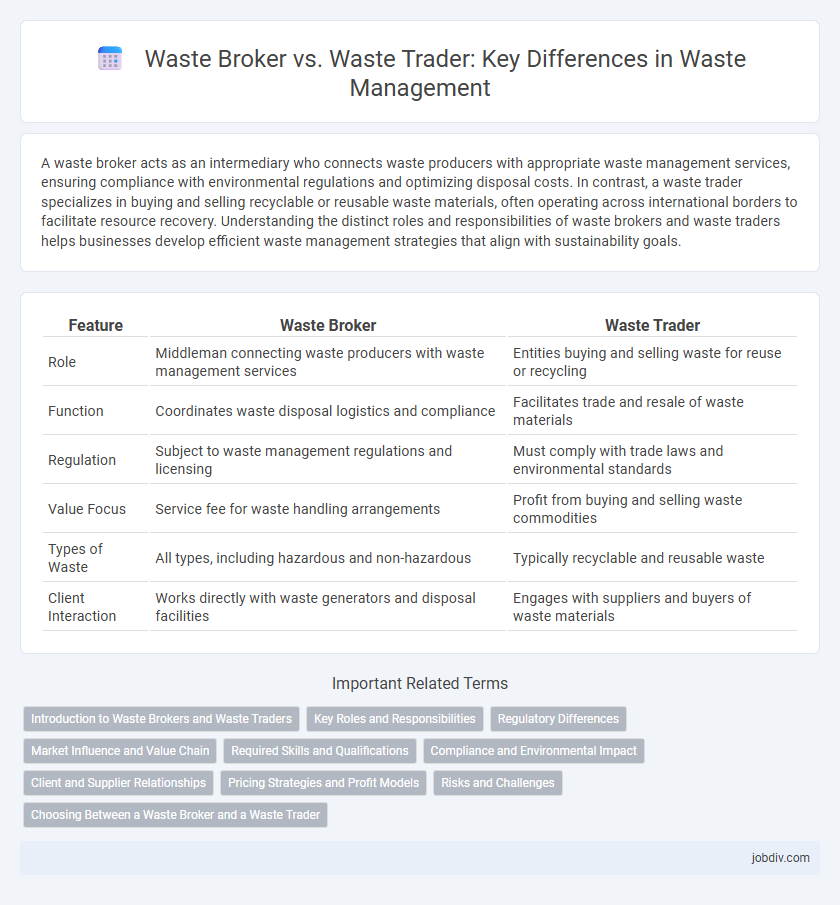A waste broker acts as an intermediary who connects waste producers with appropriate waste management services, ensuring compliance with environmental regulations and optimizing disposal costs. In contrast, a waste trader specializes in buying and selling recyclable or reusable waste materials, often operating across international borders to facilitate resource recovery. Understanding the distinct roles and responsibilities of waste brokers and waste traders helps businesses develop efficient waste management strategies that align with sustainability goals.
Table of Comparison
| Feature | Waste Broker | Waste Trader |
|---|---|---|
| Role | Middleman connecting waste producers with waste management services | Entities buying and selling waste for reuse or recycling |
| Function | Coordinates waste disposal logistics and compliance | Facilitates trade and resale of waste materials |
| Regulation | Subject to waste management regulations and licensing | Must comply with trade laws and environmental standards |
| Value Focus | Service fee for waste handling arrangements | Profit from buying and selling waste commodities |
| Types of Waste | All types, including hazardous and non-hazardous | Typically recyclable and reusable waste |
| Client Interaction | Works directly with waste generators and disposal facilities | Engages with suppliers and buyers of waste materials |
Introduction to Waste Brokers and Waste Traders
Waste brokers act as intermediaries, connecting waste generators with licensed waste disposal and recycling facilities to ensure compliant and efficient waste management solutions. Waste traders specialize in the buying and selling of waste materials, often focusing on recyclable commodities to facilitate circular economy practices. Both roles contribute to optimizing waste streams, but waste brokers emphasize service coordination while waste traders prioritize market transactions.
Key Roles and Responsibilities
Waste brokers act as intermediaries, connecting businesses with licensed waste management service providers to ensure compliant and cost-effective disposal solutions. Waste traders specialize in buying and selling recyclable materials, managing the logistics and compliance associated with material recovery and resale. Both roles require detailed knowledge of environmental regulations, but brokers focus on service coordination while traders emphasize material transactions and market trends.
Regulatory Differences
Waste brokers facilitate the arrangement of waste transactions between generators and disposal or recycling facilities without taking physical possession of the waste, thereby being subject to brokerage-specific registration and licensing requirements under environmental regulations. Waste traders, on the other hand, engage in the buying and selling of waste materials, often taking legal ownership and physical control, which subjects them to stricter regulatory frameworks including waste carrier licenses and adherence to hazardous waste transport and handling standards. Compliance differences impact record-keeping, reporting obligations, and liability, with waste traders facing more rigorous oversight due to their operational responsibilities in waste custody and transfer.
Market Influence and Value Chain
Waste brokers act as intermediaries facilitating transactions between waste generators and waste processors, leveraging established networks to drive efficiency and compliance within the waste management value chain. Waste traders engage more directly in the buying and selling of recyclable materials, influencing market prices through supply and demand dynamics and often operating in secondary commodity markets. Market influence of waste brokers extends to regulatory adherence and customer relationship management, while waste traders primarily impact commodity valuation and material flow within the recycling ecosystem.
Required Skills and Qualifications
Waste brokers require strong negotiation abilities, regulatory knowledge, and expertise in logistics management to effectively connect waste producers with disposal services. Waste traders must possess in-depth understanding of market dynamics, commodity valuation, and compliance with environmental laws to facilitate the buying and selling of recyclable materials. Both roles demand proficiency in data analysis, communication skills, and awareness of sustainability practices to optimize waste management solutions.
Compliance and Environmental Impact
Waste brokers manage the contractual agreements between waste producers and disposal facilities, ensuring strict compliance with environmental regulations such as RCRA and EU Waste Directive to minimize legal risks. Waste traders focus on the buying and selling of waste materials, often requiring detailed knowledge of hazardous waste classifications and transport regulations to prevent environmental contamination. Both roles demand rigorous adherence to compliance standards to reduce illegal dumping and promote sustainable waste management practices.
Client and Supplier Relationships
Waste brokers act as intermediaries connecting clients with certified waste suppliers to ensure compliant disposal solutions, often managing the entire process and maintaining regulatory standards. Waste traders primarily focus on buying and selling waste materials between suppliers and buyers, optimizing value through market-based transactions but typically offering less hands-on service to clients. Client relationships with waste brokers tend to be more personalized and service-oriented, while waste traders emphasize transactional efficiency and supply chain optimization.
Pricing Strategies and Profit Models
Waste brokers primarily generate profit through commission-based pricing models, earning a percentage fee by connecting waste producers with disposal or recycling facilities, which allows them to leverage volume without owning physical assets. Waste traders, on the other hand, operate by buying and selling waste materials directly, setting prices based on market demand, material quality, and global commodity trends to maximize margin. Both models require deep market insights, but brokers typically focus on transactional efficiency while traders emphasize price arbitrage and market timing.
Risks and Challenges
Waste brokers face risks including regulatory non-compliance, potential liability for improper waste handling, and challenges in verifying the credentials of waste traders. Waste traders encounter risks such as fluctuations in market prices, illegal waste disposal practices, and difficulties in maintaining transparent transaction records. Both roles must navigate complex environmental laws and ensure stringent due diligence to mitigate financial and legal consequences.
Choosing Between a Waste Broker and a Waste Trader
Choosing between a waste broker and a waste trader depends on your business needs and compliance requirements. Waste brokers act as intermediaries, coordinating the movement of waste between producers and disposal facilities, ensuring regulatory adherence and often providing documentation management. Waste traders, on the other hand, primarily focus on the buying and selling of waste materials for recycling or resale, emphasizing market value and commodity exchange.
Waste Broker vs Waste Trader Infographic

 jobdiv.com
jobdiv.com